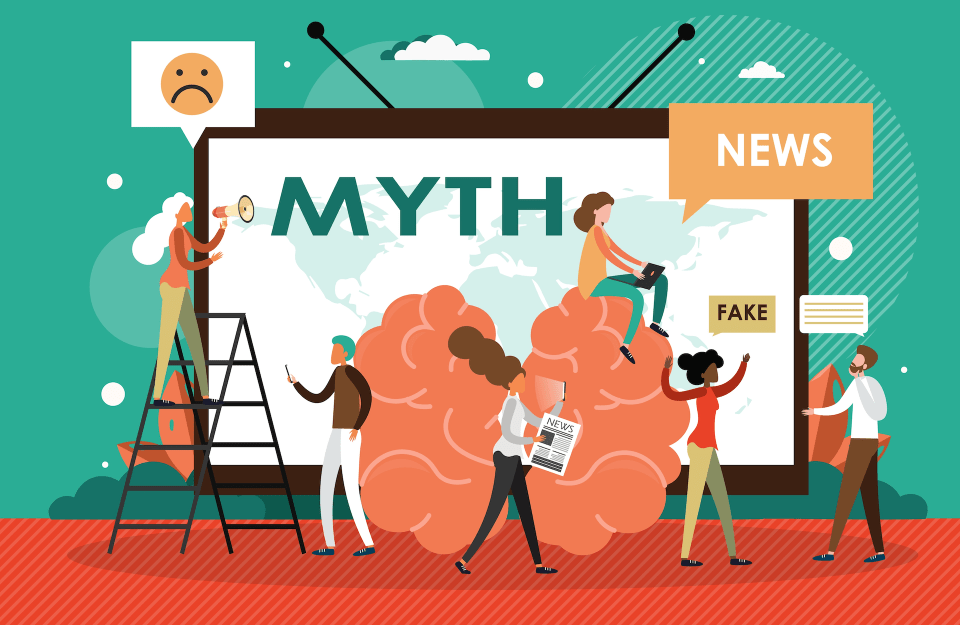Instead of Refuting Misinformation Head-On, Try “Bypassing” It
A new study from Professor Dolores Albarracín has found that redirecting an individual’s attention away from misinformation and toward other beliefs can be just as effective as debunking it.

It’s tempting to argue with someone who is misinformed by showing them studies and articles that prove they’re wrong. But new research shows that there’s another, less confrontational, way to get someone to change their mind.
A new study in Scientific Reports, led by Dolores Albarracín, a social psychologist who specializes in attitudes and persuasion, and the Alexandra Heyman Nash Penn Integrates Knowledge University Professor at the University of Pennsylvania, has found that “bypassing” misinformation is just as effective as debunking it head-on.
This way requires considering what conclusions one wants their audience to reach — Is it that vaccines are safe? Or that Genetically Modified (GM) foods are something to support? — and supporting those conclusions with positive facts the audience may not have considered.
The Bypassing Misinformation Strategy
Though debunking falsehoods with contrary facts works to change people’s beliefs about falsehoods, it isn’t easy. No one likes to be corrected and repeating misinformation to correct it runs the risk of cementing that misinformation into a person’s memory or alienating them if they feel attacked.

In the paper, Albarracín — Director of the Science of Science Communication division at the Annenberg Public Policy Center (APPC) and a faculty member at the Annenberg School for Communication, the School of Nursing, and the Department of Psychology — and co-author Christopher Calabrese, formerly a postdoctoral fellow at APPC and now assistant professor at Clemson University, propose bypassing as a new method for addressing the outcomes of misinformation.
The bypassing strategy involves identifying a conclusion, such as “vaccines are safe,” and figuring out how to bolster that conclusion with accurate information that doesn’t directly refute misinformed claims.
For example, to bypass a belief that vaccines cause health harm, one might highlight the positive impacts that vaccines have had around the world, such as vastly reducing child mortality. That alone can increase the conclusion that vaccines are desirable, without confronting that person with facts and figures to counter a false belief about vaccines.
"A fear that vaccines cause autism might be one belief that shapes a person’s attitude toward vaccines,” says Albarracín, who is also the director of the Social Action Lab at Annenberg, “but humans hold many beliefs at once. Bringing attention to positive ones can change people’s minds.”
Correcting vs. Bypassing
For the study, Albarracín and Calabrese carried out three experiments to test the efficacy of this strategy.
During the first two experiments, participants read an article falsely claiming that a newly-developed GM corn product causes severe allergic reactions.
Some participants then read an article disputing the previous article through facts and an alternate explanation — a correction to the misinformation. Others read an article highlighting a positive benefit to GM foods, either their role in saving bees or ending global hunger — bypassing the misinformation.
As a control, some participants didn’t receive a second article, and others read a second article on an unrelated subject. A third experiment tested a different misinformation article — one falsely claiming that GM corn accelerates tumor growth in rats.
Results
During each experiment, the researchers measured participants' attitudes toward policies that restrict the manufacturing of GM foods (marking them as good or bad and helpful vs. unhelpful) as well as their intention to support these policies.
They found that both bypassing and correction led to less support for GM food restrictions, implying that both had reduced the initial impact of the misinformation that GM foods cause allergies. These results held for attitudes toward GM restrictions and intentions to support the restrictions, which were less positive.
We live in a world where misinformation spreads like wildfire. Bypassing is a tool that policy makers and influential figures should use to fight this misinformation, the researchers say.
“There’s this perceived pressure to go out and debunk misinformation, but we can also strengthen other beliefs and consider misinformation within the wider system of beliefs people hold,” Albarracín says. “Bypassing allows you to work from the point of view of what conclusion you want — highlighting beliefs that support it instead of focusing solely on contradicting the misinformation.”
The paper, entitled “Bypassing misinformation without confrontation improves policy support as much as correcting it” was published in Scientific Reports.



